Hello,
Here is a quite a big and complete article on the concrete applications of Metavers in the hospitality world. This article was written by Tony Loeb and Thomas Yung. Make yourself comfortable, have some time to read it, it’s a lot to take in, but you won’t waste your time and by the end of it you’ll have acquired a good base on Metavers and what can be done with them in the hotel industry.
You will see that, quickly, we will speak of Metahotel to designate the virtual reproduction of your establishment.
Reading time of the text: 14mn
Videos (French only): 8mn + 25mn + 23 mn + 5mn (all videos are produced by us)

Plan
1. What is a Metaverse?
2. How to access it?
3. What to do without a headset?
4. What to do with one headset?
5. And with several VR* headsets?
6. With significant investment?
7. Conclusion
VR*: Virtual Reality

Do we still need to introduce you to Metavers and all that it can do and revolutionise in our tourism sector?
If you have seen our video presentation of a Metavers, which we enjoyed making, you already know that there are many future possibilities and revolutions to explore. And we’re only talking about tourism. If you haven’t seen this video in which we present the possibilities of working and collaborating remotely in digital workspaces, then watch it, it’s here (French only), but we warn you, it’s 20 minutes long (it’s also further on in this article).
Today, through this article, we propose you to discover what it is already possible to set up for hospitality professionals by investing little at the beginning and then all that we imagined that it will be possible to do in the near future with a little more financial investment.

By the way, what is a Metavers ?
There are many Metavers. A Metaverse is a virtual place where humans, equipped with a headset or VR glasses, can meet, interact with each other and interact with the space and the room.
Meta (the new name for Facebook) provides us with free virtual spaces: Metavers. Horizon Worlds, for example, is a playful Metaverse in which you can play, meet and build your own world. Workroom, again from Meta, is a meeting room, allowing up to 50 people to work together. There are many other publishers/hosts of virtual infrastructures. VRChat, like Recroom, is a recreational world, a kind of 3d chat, with many rooms. BigScreen is a Metaverse dedicated to movies, it is a movie theater where you can invite your friends to watch a movie or join a room to watch a movie, screened by a third party. Engaged is an educational Metaverse, which offers rooms for classes, meetings, with the possibility of having objects, models, etc. Spatial, MeetinVR, Noknok, AltSpaceVR, etc. are all Metavers, more or less fun, more or less for professional use.

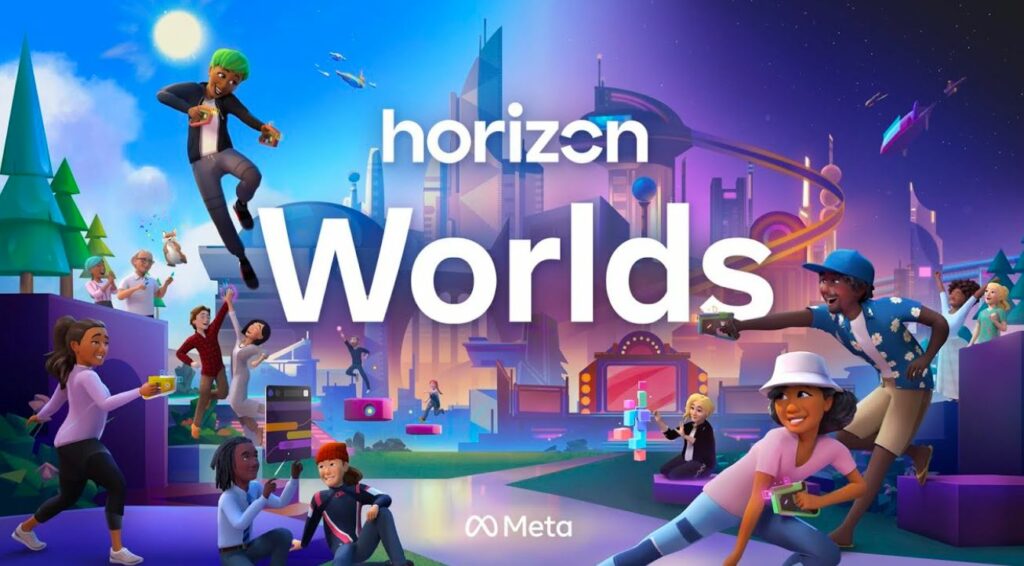

How to get there ?
You need a headset or virtual reality glasses. Quest 2 is the most affordable at the moment (1er half year 2022). But there are others, HTC Vive, HP Reverb, Playstation VR, etc. This is the beginning, the technology is evolving very quickly, new players will appear, there will be mergers of several companies, updates, etc…
Meta has already announced the arrival of its ‘pro’ headset, Project Cambria, for the end of 2022. Headsets will become more miniaturised, perhaps integrating with existing tools, such as glasses, etc. Today, headsets are rather heavy and therefore not very ergonomic, not very usable over long periods. There is also a question of autonomy, some headsets are said to be autonomous and work without needing to be connected to a computer (like Quest 2), others are not. Standalone headsets are more convenient, in our opinion, but require a larger battery, like your smartphone.
Afterwards, it’s like a smartphone, you have access to an app shop, you have to download the virtual world you want to explore (Horizon worlds, Engaged, Spatial,..) and launch the app once installed in the headset. The Quest 2 (Meta) headset runs on a hybrid version of Android. It is quite simple and ergonomic, as long as you stay in the « official » environment. It is possible, as on a smartphone, to « jailbreak » and access third party app shops, as on a smartphone, it becomes a complex operation, reserved for geeks.

Example of what the user sees/sees when they plug in their headset and join a metaverse, here at a conference event, in walk-thru mode

Without the need for a headset
At first you don’t necessarily need to invest in a virtual reality (VR) headset. Please note that not needing to have a VR headset does not mean that you will not have to invest in one. Above all, it means that you won’t have to train in VR to take this first step. Here we are not really in VR… but we are getting a foot in.
Virtual tour of your hotel
The first thing you can provide with VR is a virtual tour of your hotel (and this can be quite expensive). Example: https://www.agencewebcom.com/portfolio/vr or https://blog.capterra.com/how-to-create-a-hotel-virtual-tour/
Even if it is not cheap, the result is splendid and you will certainly convince many guests to come and stay with you. It is also an opportunity to highlight an element that is too often neglected on your websites and booking platforms: breakfast.
Be careful though, this will only be of interest if the visual of your hotel is one of your strong points. If your hotel is more of a budget hotel then there is no point in investing here. Remember that VR is a 360 degree photo, so there is no way to cheat by only focusing on the positive. In VR you can see absolutely EVERYTHING.
But, again, there is no interaction, the visitor walks around in a « static » mode, so it is not strictly speaking VR. But digitising your establishment into an immersive 3D representation is the first step. This 3D visit can then be offered.



Virtual tour of the area
Without the need for any investment, you can also showcase the hotel’s surroundings via applications such as Wander. Wander is a paid application that uses Google Street View to allow you to visit a neighborhood, a city, etc. Thomas uses it a lot, it’s very imperfect, it’s static, but he uses it to visit places he’s been to before, and it makes it an emotional experience. It’s also perfect for choosing a hotel, for visiting the area beforehand. The app is worth 9€ in the app shop.
You are a few minutes walk from the Eiffel Tower, don’t say it, show it! Your hotel overlooks the sea, show how true it is!
VR is a fantastic immersive tool to sell yourself and your neighborhood. In this chapter we use the visitor’s headset, without having one ourselves, and we leave the possibility for those who do not have a headset to experience the immersion through a 3D/360 virtual tour from a 2D screen (computer or smartphone).

With a VR headset
If you want to go further into the world of VR, you will need to invest in at least one headset. The Quest 2 from Meta is, for example, on sale for 350€ in all the local tech shops, which is a small investment considering what it can bring, considering the technology on board. Be careful, it’s still imperfect, it’s the beginning, it’s going to evolve very quickly. Think of it as the Iphone 1 of 2007, a great thing, with a crazy potential, but to be improved.
How about an immersive booking, a one-to-one meeting with your booking agent in a normal room (we’re not yet in a hotel-like metaverse). But there is value in making a face-to-face reservation with a local expert who knows the establishment, the territory and who is « physically » in front of me. It improves trust, guest relations and probably other performance indicators for the establishment (ADR, upsell, length of stay, etc.). This could allow us to regain control of the guest relationship versus the OTAs, provided that we do not fall behind, once again, by the OTAs and what they will offer in terms of immersion.

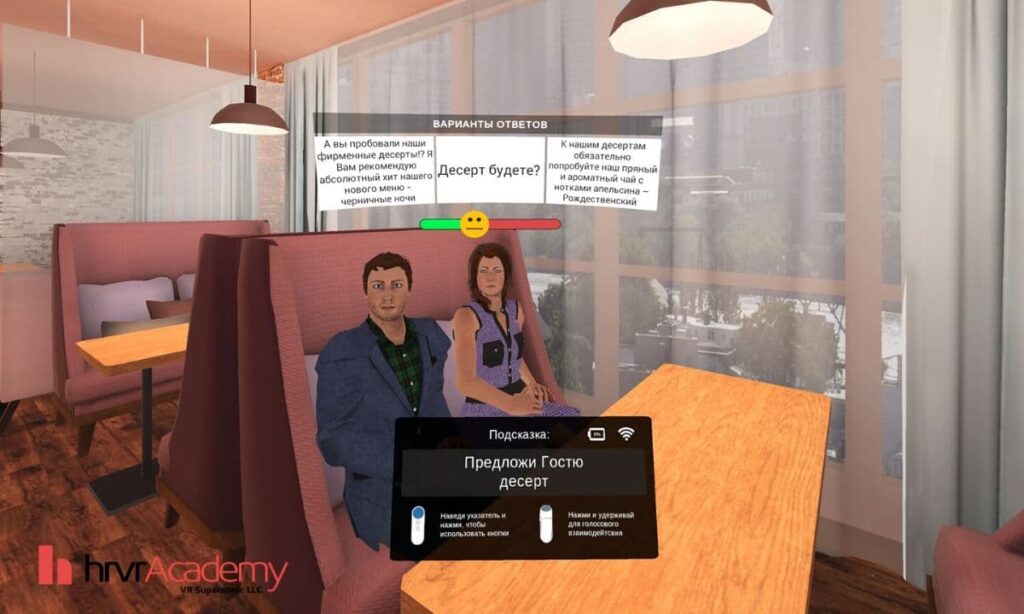

Increased Check-in
This can also be useful for check-in, for example when you have a Japanese guest who arrives and your receptionists do not speak this language, you can then carry out the check-in in VR and the guest will be able to do it in his language and will feel privileged and immediately at ease in your establishment. Yes, today we find it ridiculous to do a check-in in VR, each one with a headset on the head while the guest is there, in front of us, at the reception desk… in the same way that we found it ridiculous to make a booking via smartphone/b00king.com while the guest was in front of the hotel…. We can imagine that the check-in of the guest present at the reception desk could be done by a 5-star receptionist located in another city…. For a VIP client, in his language, with a level of service/relationship that I don’t know how to do internally, etc. We can even imagine that within a chain, it is always the same receptionist who does my check-in, wherever I am, he takes care of me, in the end we know each other well, it’s almost a friend, a relationship.
Easier recruitment
From the point of view of your company, you can also use virtual reality to make « improvements ». For example, to recruit your future employees, you can organise job interviews in a Metaverse in a room like the one we used in our video (WorkRoom). The same goes for all professional meetings, whether with the accountant or with service providers for a future project in your hotel. Here, the interest is to save time, to eliminate travel time, while keeping a « physical » relationship. We are not yet in a Metaverse like your hotel, but you can see where we are going…


Multi-lingual medical expert
A sick foreign client, locked in his room… you can’t find a doctor who can intervene in a rare language or a specialist in a particular disease? Bring in a medical expert, remotely, thanks to VR and medical sensors placed on the client/patient.
Post-stay relationship
You collect opinions after the stay, you send an email with the northern solicitation … give your guest an appointment in a virtual reality room, ideally while he is in the boarding room at the airport and therefore has nothing to do, and collect his opinion face to face, you will have much better returns. We’ll even invent a virtual conversational robot that will do this without the guest suspecting anything (we’ll then have captchas to check whether we’re dealing with a bot or not).

With several VR headsets
If you really want to/can invest in more than one headset, and that’s a very good thing, because we tend to develop this aspect more and more, we have thought of a few things to put in place, especially internally.
In principle, the headsets will be on site, in the establishment, so it’s an internal use, unless you can/want to send headsets by post until we are all equipped (a few years, don’t forget that it only took 10 years to equip 75% of the French population with a smartphone, and this since 2007 with the arrival of the iPhone. The first real commercialization of a VR headset dates back to March 2016 (Oculus Rift), so it’s been 6 years…)
We agree, shipping VR headsets to guests to enjoy an experience is laborious, especially since each headset has to be set up, with an account, accesses, apps installed, etc… it’s a real hindrance. In the same way that we don’t ship smartphones to guests, it’s personal a smartphone.

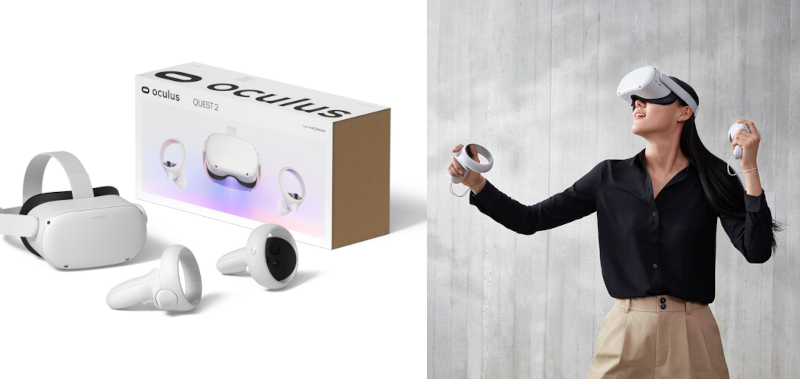

The focus is therefore on internal uses.
Immersive staff training
Staff training. Bringing the team together in a virtual room for training allows trainers/experts to be brought in who would otherwise not be able to come.
This would create immersive situations for better training. We all think of mandatory fire training. Having a situation, a « virtual » fire to put out with an extinguisher is much better than theory. In the best of cases during face-to-face training, you handle, test and extinguish a fire, but quickly, there are people to train. Imagine in VR, we can repeat the gesture to perfection, do it on many types of fire, etc… an undeniable plus.
The same goes for the check-in training, for the difficult guest. In an immersive world, I can repeat the gesture, the procedure many times, the role-play is almost infinite. Airplane pilots train in simulators on many problematic situations and fortunately, imagine that you have a simulator with delicate situations dedicated to your staff…. a killer.
Enriching the guest experience
We can also provide/loan headsets to resident guests and allow them to enrich their stay, to wear the headset in their room, to revisit the city, the neighborhood, to get an idea, to select the best experiences of the area.
Extra amenities
No fitness room? No need to invest in a real gym, but a headset in each room and a fitness app could do the job. Mind you, this will be fitness, not machine use. Les Mills already offers a VR application to do a training session, which is amazing. According to the application, you could do exercises alone in your room, but in a group class, outside, in an emblematic place, or not.

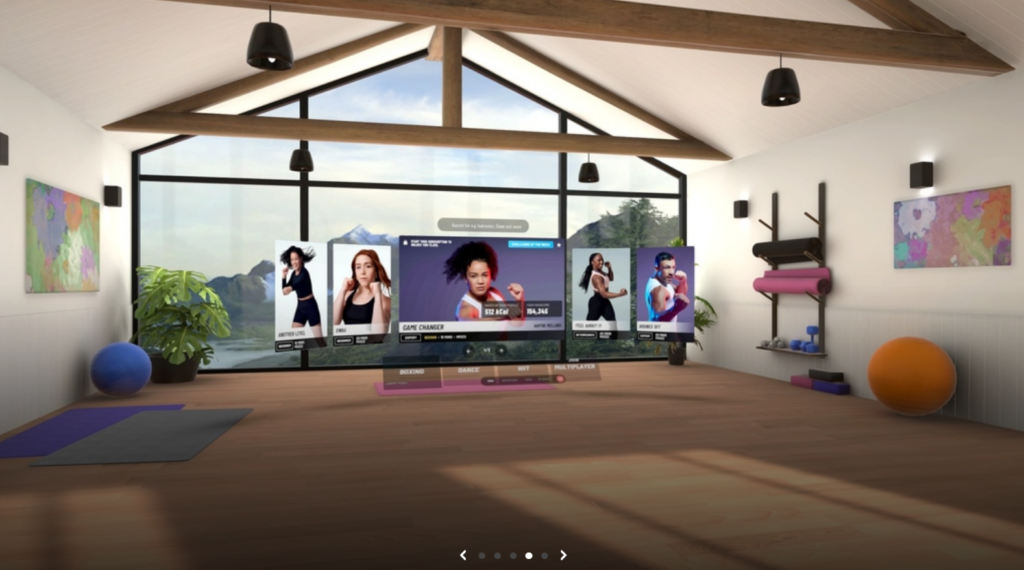

Cinema room.
With an application like BigScreen, you could offer your guests the chance to watch a film as if they were at the cinema, no need to create a ground floor or basement cinema. They could even meet there and have a joint screening.
No nightclub in the hotel? it’s too noisy, too heavy …. You see me coming, I’ll stop here, you understood, but yes, people will dance alone in their room having the impression of being on a dance floor with several people…

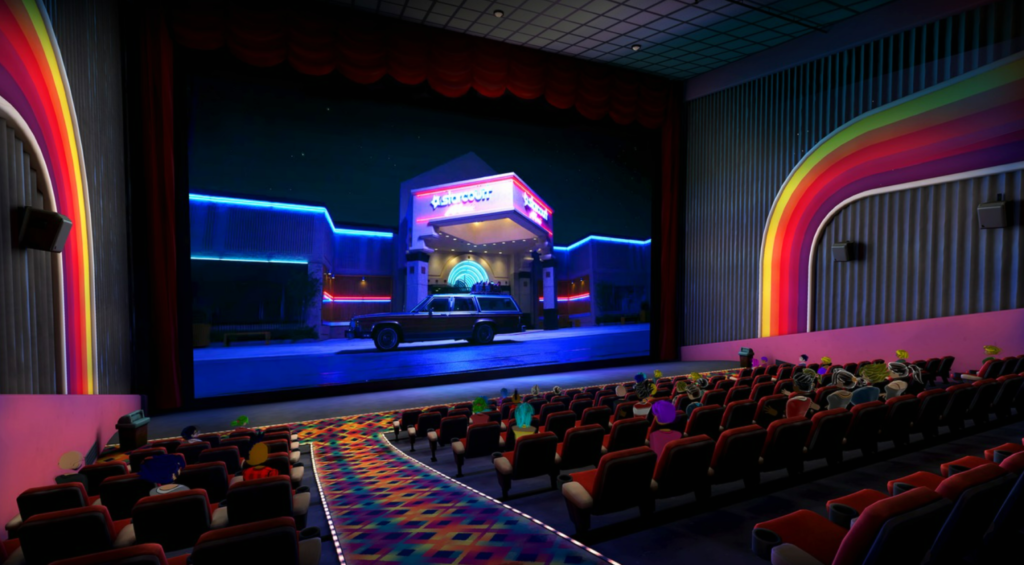

Meeting between guests, promote contact
A few years ago, an application called Wombee offered to help hotel guests meet each other. Based on the principle that some travellers (rather corpo) are solitary travellers and that there is a demand for meetings, Wombee proposed to put people in touch with each other in order to create links and thus share a jog, a meal and a carpool, etc… By providing your guests with a headset, you could encourage contact, networking, for a better experience in real life. The « social » aspect is important, it is an experiential dimension.
Team building
You are lucky enough to have a small (or no) hotel group. Bring your executives together in a digital room, no more long and expensive trips. Beware, it is not a question of replacing all the travel, we need to see, touch, talk, smell … for real, even if we can do all this from a Metaverse (not yet the smell, but it will come).
We tested, below, the mini-golf in #teambuilding mode, Tony in the Paris region and Thomas in Anjou (300km away from each other). We had a lot of fun 🙂


Convergence with in-room technology
Many hotels allow the guest to check their bill on the day of departure from the TV in the room. There is a convergence between the PMS, the guest and the technology… imagine what will be achievable by coupling the PMS to Metavers, what the guest will be able to achieve, what you will be able to collect as information. It’s not just the PMS that will be coupled, but the whole technology will be coupled, with your technology, with your digital assistant.
Room service order
In the same spirit, imagine ordering room service from the room, with a headset on your head… an enriched menu, a chef who cooks in front of you, a sommelier who shows you the vineyard, etc…. but the food, the drink, arrive in the room for real, that’s the objective….
Animation
Akick-ass animation program, organise an escape game in the hotel, propose an exhibition, an art gallery, a real-life Cluedo… everything is possible with VR.
Guest relations
If a headset is available in the room for each guest, you can have a virtual room dedicated to guest relations, receive them, talk to them, listen to them, advise them, much better and faster than at the reception desk….

With greater resources
Other elements were also imagined that could be realised, but with a greater investment of time and money.
We will find the uses that we have just presented, with advances. What we see, what we believe in, is the total digitalisation of the establishment. It is the reproduction of the establishment in a Metaverse, pixel-perfect, photorealistic as the professionals say.
Imagine, your hotel is reproduced 100% faithfully in a Metaverse, your hotel is a Metaverse unto itself …. This is called a MetaHotel!


Meta-booking
The booking process is accompanied by a visit to the establishment, the guest actually chooses his room, we move to a booking by room and no longer by type, we move to revenue management by room and no longer by type of room.
The immersive reservation
With this comes the whole immersive visit of the establishment, we particularly like the possibility of enhancing the value of breakfast, often the poor relation of the communication. Imagine, you show a couple of potential clients around the hotel from the Metaverse, you visit some of the rooms, the restaurant, the kitchen, the breakfast room is set up, the buffets are there, the chafing dishes are smoking…. It almost smells good …. The senses have a real influence on acting out….

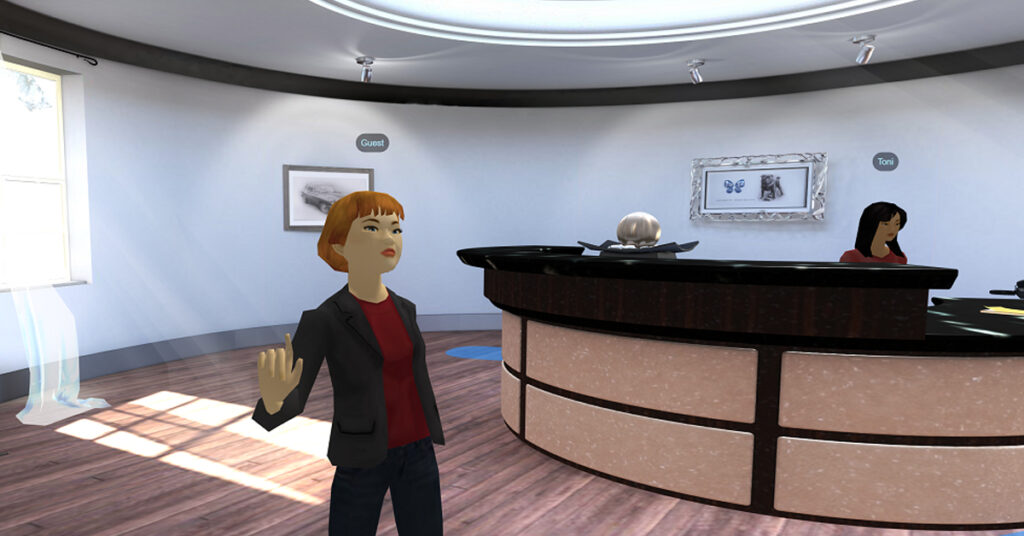

Reception, press, eductour … easy
You organize weddings, special visit, you want to make a reception of TO nothing easier, a press visit, an eductour, etc… you see the potential
Meta seminar room rental
Virtual meeting room rental is also possible, what Meta does with Workrooms, it should also be proposed. We can already hear some people saying that it is not our job, but is it Meta’s (Facebook) job to offer meeting rooms? No, it is they who come to walk on our land, it is up to us to go hunting on theirs too (or die).
Extend your concept as far as possible
Some hotels are themed, more and more. I know a chain called Les Hôtels Littéraires (The Literary Hotels). They have hotels on the theme of known author in the literature “Marcel Proust”, “Rimbaud”, “Marcel Aymé”, “Jules Verne”… Imagine taking the concept even further and, thanks to VR, having a check-in by Marcel Proust himself or some other « animation ». Imagine what Disney or the Parc Astérix could put in place.
Better selling of extra services
What would your guests say if they could have a look at your services before making their choice? It would be great for them, but also for you to highlight your options such as the massages offered in your wellness area.
Cross-selling like a god
Imagine, during the pre-booking visit, for a « honeymoon » guest, with a gesture you make rose petals rain down from the ceiling, with a gesture you show such and such options… wouldn’t that trigger more reservations? It would improve the guest’s perception, reducing the dissatisfaction linked to over-generous marketing (or the opposite, if badly managed).
Reclaiming the guest relationship from OTAs
This would allow you to regain control of the guest relationship, because obviously there will only be one representation of your hotel in Metaverse, yours. Don’t let OTAs, or any other third party, take the right to represent your hotel in Metaverse, ever. After brandjacking, guestjacking, here is metajacking…. (all jacking explained here)

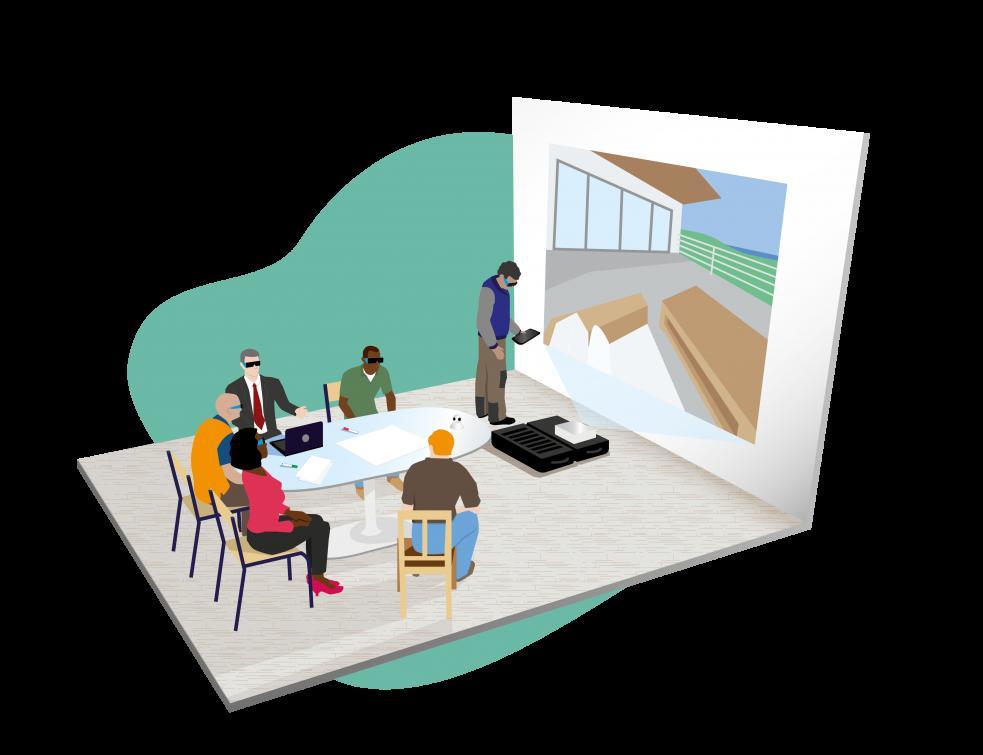

Immersive construction site meetings
You need to make renovations, have the architect intervene directly in the Metaverse, make the preparatory site meetings from your virtual hotel metaverse, your MetaHotel.
Project the renovations in the Metahotel
Newdevelopments, renovations to come? Visualize what it will look like directly from your MetaHotel, have the audience, the guests, vote on the choices, the amenities what they prefer. Send a private virtual tour of the hotel after renovations to your former clients! The co-construction aspect is important in the guest experience.
A real fire drill
Have your teams do a real fire drill from the meta version of your hotel. We rarely do fire drills. From time to time, the alarm is triggered, but that’s all. Thanks to the immersive representation of your hotel, you will be able to evacuate a person with reduced mobility from the 3rd floor, a family with children, a foreign couple who doesn’t understand, and you will repeat the exercise as long as the situation is not mastered, as long as you don’t manage to evacuate in time, in a gamification dimension as well.
Star ranking without an on-site auditor
Your star ranking is about to expire, so do your pre-audit from the Metaverse version of your establishment. We can even imagine that there will be a certification system to prove that the virtual version complies with the real version and therefore the classification audit can even take place from your Meta-Hotel.
Seducing for a better job
We don’t even mention job interviews from your metahotel, which are simpler, quicker, and surely more seductive to attract the best people.

Conclusion
As you can see, there are many applications. It is not necessary, at first, to invest heavily, but it is necessary to invest.
There are many applications, at all levels. For guests, for your teams, for you, for your partners, for marketing, sales, renovations, etc.
There are many levers to be found. We are convinced that the value it brings means that this world, these relationship channels, will become irresistible, especially in tourism where the relationship necessarily begins at a distance.
There is a little science fiction aspect to our article, it’s done on purpose, but you’ll see, in 5 years, when we read this article again, we’ll be laughing about it.
There are many issues at stake, particularly in the sense of ownership: who owns a MetaHotel, who can reproduce my hotel in a meta universe? Don’t let a third party do it for you, or else it’s a well thought-out and assumed strategic choice.
The MetaHotel is a lever for guest relations, better service, satisfaction, data collection, human resources, in short, it crystallizes many issues related to hotel operations. This world is much closer than you think, we explore it every day, we are fascinated every day by what we discover and what we can do with it. Stay alert, agile and listening. It is not you who decides, it is the guest, through use, who imposes the changes.
We are available to accompany you there….
Tony Loeb
Thomas Yung
P.S.: Still in doubt? There are now 171 million VR users worldwide and the figure will reach 297 million by 2024.








